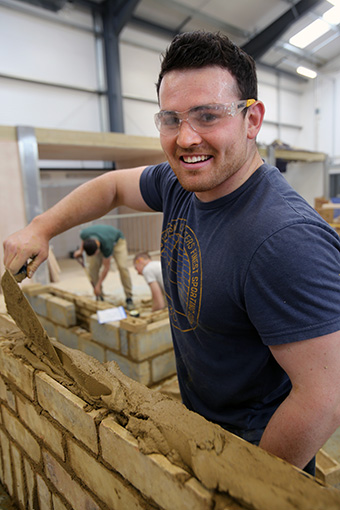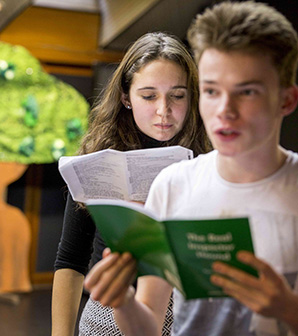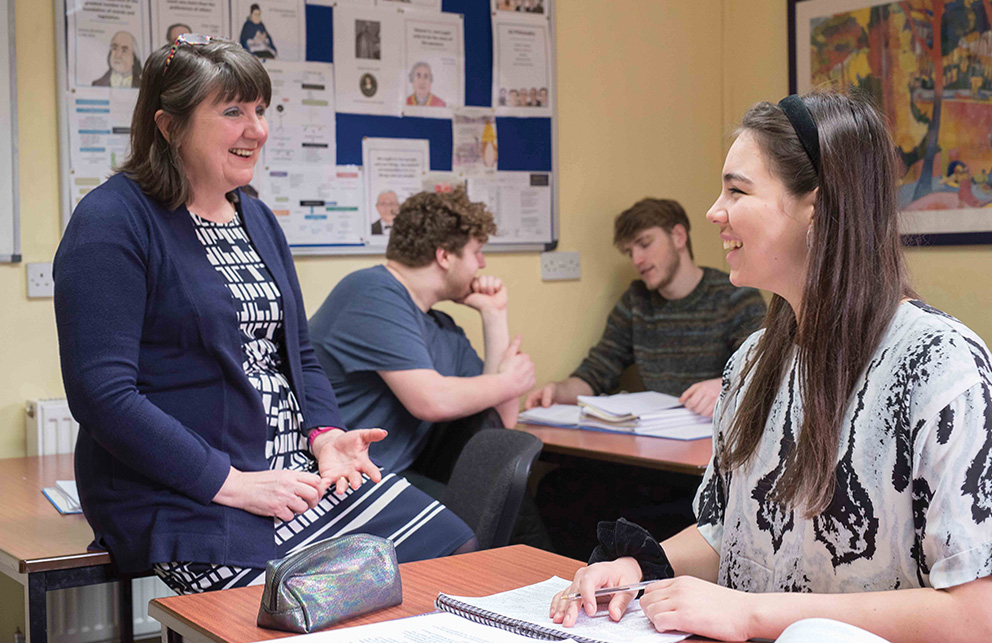Image: MPW Cambridge
Deciding which way to go with post-16 education can be a daunting task. Charlotte Phillips takes a look at what’s on offer around Cambridgeshire
You’re 16, sweet or otherwise, and raring to leave school and get on with the rest of your adult life.
Not so fast, says the government. In England, at least (things are different in other parts of the country), you now have to sign up to full- or part-time education or work-related training until you’re 18. And if you didn’t quite manage a C grade or better in GCSE English or maths, you’ll be expected to keep on studying them at the same time.
Inevitably, not everyone’s pleased. For many students, however, those extra two years of studying, whether classroom, office or workshop-based, can be a real revelation, helping them discover what it is that really inspires and enthuses them.

In this area, fortunately, inspiration and enthusiasm are pretty much the norm when it comes to sixth form options. From the budding young scientists and mathematicians at UTC Cambridge, recruited because of their yen for STEM subjects – science, technology, engineering and maths – to the students at Cambridge Regional College, one of the area’s largest further education providers where a mind-boggling array of vocational courses is on offer, there’s almost no interest or talent that isn’t catered for.
It’s just as well that experts in charge of our local schools and colleges spend hours genning up on the different options that are available to sixth formers, so the students don’t have to.
Not that long ago it seemed as if there were just two options for school leavers – A levels and higher education for the minority; work, sometimes with some form of an apprenticeship or training, for the rest. Today, it’s not an either/or choice. Our institutions are charged with ensuring that the nation’s 18-year-olds are fully equipped to take advantage of a future that’s shaping up to be ever more exciting and faster moving.
And an ability to embrace the unknown is a key component in the process, explains Tom Cassidy, head of sixth form at Cambridge International School, given the acceleration in the pace of change. “While we can’t possibly foresee the industries that will emerge in the future, what our colleges can do is encourage students to develop an agility and flexibility of mind that helps them to be prepared to make the most of them,” he says. Image: Cambridge Regional College
It’s also important to play to your strengths, stress local education experts. While some students are drawn towards a particular area of study – maths, say or sciences – early on, not everyone has that degree of certainty. For these students, drawn equally to physics and French, art and algebra, the process of narrowing down their options can be a painful one.

When it comes to making a final decision on which qualifications to study, says Tom Cassidy, it can help to think in terms of how you plan to use them later on. “They broadly fall more or less into academically respected and targeted qualifications. If I know I want to go into journalism, for example, I might take a targeted A level in media studies.”
Looking at the pros and cons of different academic paths is also stressed by Simon Armitage, head of sixth form at the Stephen Perse Foundation. “We help young people to weigh up the benefits of studying A levels or the International Baccalaureate (IB),” he says.
He points to the current changes in A levels, with the AS becoming a separate exam. At the Stephen Perse Foundation, the focus is now on two-year A level courses. “It allows students to focus on studying up to four A levels alongside a wider curriculum of enrichment activities and our Year 12 Theory of Knowledge course, which is incredibly valuable for university preparation,” he says.
Hills Road Sixth Form College, too, is big on A levels, offering an amazing choice of 35 subjects in virtually any combination.
Image: Stephen Perse Foundation
But A levels and the IB aren’t the only route to success. UTC Cambridge is on something of a mission to promote the BTEC. Like A levels, also offered at UTC, it can lead to excellent career and higher education options – but can be slightly misunderstood, says Elizabeth Andrews, business and HR manager at the college. 
“The BTEC gives students who want a career in science and technology an open door into those industries. You can go to some very competent universities and are effectively getting your three A levels through the BTEC route.”
Then there are the apprenticeships offered by Cambridge Regional College, which span everything from building to hairdressing and catering and combine hands-on experience with formal qualifications, so students can learn as they work.
With so many options, you might assume that at this tender age, young adults would struggle to be able to predict who they want or plan to be and what they want to do by the time they’re in their 20s.
You’d be surprised by their certainty, says Stuart Nicholson, principal of Cambridge Centre for Sixth-form Studies (CCSS). “An awful lot of them have that clarity. They know they want to go to university and know what sort of course they’re interested in.” Image: Stephen Perse Foundation
And that desire to succeed is something that really counts, he says. “One of the key things I’m looking for is ambition. Students need to know what they want to do.”
But for even the most determined, making all these life-changing decisions at the ripe old age of 16 is best done with a spot of expert guidance.
In an area that’s so rich in specialist sixth form centres, it’s vital to ensure that students pick an environment that’s a good match for their personalities and learning styles. Teachers at Hills Road, for example, have a range of strategies at their fingertips to help every student cultivate effective learning habits – something that stands them in good stead when they move on.

Elizabeth Andrews at UTC advises asking about support. “If students don’t understand a topic or fall behind, is there an opportunity to have catch-up sessions or extra coaching that will actually help them reach the end points that they need to get the right grades?”
Monitoring is another key area, she says, to ensure that problems are flagged up early on. “How does the college check progress, because although it’s painful for the students, unless you’re being assessed, you don’t actually know if you’re hitting your targets or not.”
At MPW Cambridge, weekly tutorials with a dedicated tutor and weekly timed exams in every subject mean students know exactly how they’re doing, says assistant principal Joel Rickard. There’s similar reassurance when it comes to individual attention. “With a maximum size of eight, we make sure the classes aren’t too big so the teachers can help you when you’re struggling,” he explains.
But there’s more to life in the sixth form than study. Simon Armitage advises asking about what goes on outside the classroom. “Which societies, clubs, trips and other opportunities are available? Will you have access to explore your wider interests? And finally, what does it feel like to be part of the college? A sense of community and belonging is important.”
With its simply stunning range of high achieving sixth form schools and sixth forms and colleges, our area is definitely a hotspot for post-16 learning. And one thing’s for certain. Whichever path students ultimately decide to follow after their GCSEs, there’s a school or college out there, ready, willing and able to help them achieve their goals.

